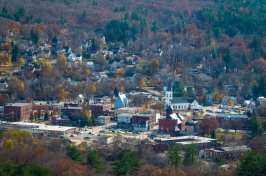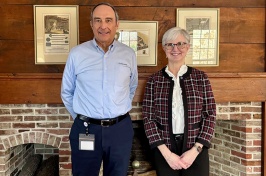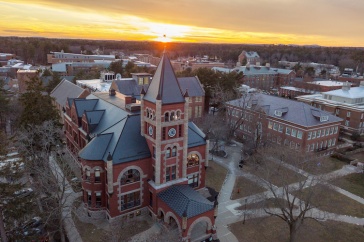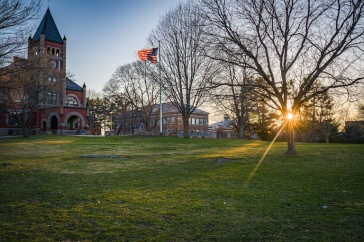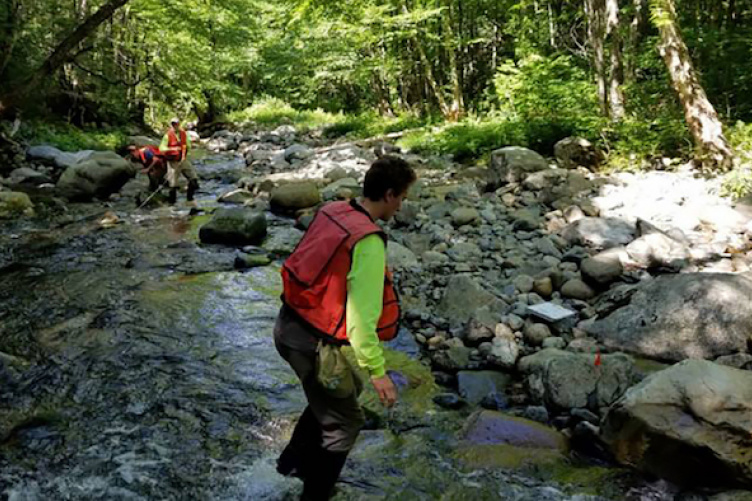
A UNH graduate student studying invasive plants in riparian forests has been named the Graduate Student of the Year by the Granite State Division of the Society of American Foresters.
“I was astonished to receive this award. It was such an honor to be recognized in the presence of so many people and agencies that I have a lot of respect for and are doing great work,” said Chad Hammer, who conducted his research with support from the New Hampshire Agricultural Experiment Station.
Hammer’s research project is titled, “The impacts of terrestrial invasive plants on natural and restored riparian forests in Northern New England.” The study quantifies the impacts of Japanese knotweed and woody invasive plant species on riparian (terrestrial habitat found next to a river or stream) forest structure, stream physical habitat, soil structure and soil behavior in northern New Hampshire. His research also assesses the effects of restoring native trees to disturbed riparian sites in central Vermont and analyzes their ability to resist invasive plants.

To quantify the impacts of terrestrial invasive plants, last summer Hammer and two 2018 UNH graduates, — Nathan Rees and Monica Newton — collected data from 80 forest structure and vegetation surveys, 40 stream habitat assessments along the White River in Vermont and Garland Brook in Coos County. In addition, they conducted 40 km of stream surveys to map and analyze the distribution of terrestrial invasive plants in riparian forests.
The research fills an important knowledge gap about invasive plants in Northern New England. Much of the research conducted on terrestrial invasive plants is focused on their distribution in the region. Little has been done to quantify their impacts to headwater stream and riparian forest ecosystems. Non-native plants make up at least 30 percent of all vascular plants in the New England region, of which 3 to 5 percent are considered invasive. Non-native invasive plant colonization also is projected to increase.
“Riparian forests provide us with many ecosystem services here in New England and are vital to streams and rivers as they increase habitat complexity and available resources for organisms at all trophic levels,” he said. “Understanding how non-native invasive plants can negatively impact ecosystem services such as water quality, bank stabilization, fish and wildlife habitat and tree regeneration in the forests and streams that we all love is very important, especially today as invasion and storm events are often projected to increase.”
Hammer has worked closely with NH Agricultural Experiment Station researcher John Gunn, research assistant professor of forest management. Gunn, who nominated him for the award, said Hammer’s research is providing a great deal of insight on how invasive plants like Japanese knotweed influence the structure of riparian forests. Calling him one of the best crew leaders he ever had, Gunn said Hammer was very conscientious with the undergraduates working with him and took the initiative to contact more than 50 landowners in Coos County to gain access to their land.
“I continue to be impressed with how hard he has worked to develop new skills that he hopes to put into practice in his career, including establishing a presence in social media through blogs about his research,” he said.
Hammer plans to defend his thesis this summer and graduate in September. After graduation, he would like to find a career in forest/freshwater/wildlife ecology in a beautiful geographic location. “If that does not happen right away, then I am looking forward to hitting the road to see as many of our beautiful National Parks as I can,” he said.
This material is based upon work supported by the NH Agricultural Experiment Station, through joint funding of the National Institute of Food and Agriculture, U.S. Department of Agriculture, under award number 1010675, and the state of New Hampshire.
-
Written By:
Lori Tyler Gula, PhD | NH Agricultural Experiment Station | lori.gula@unh.edu | 603-862-1452




























